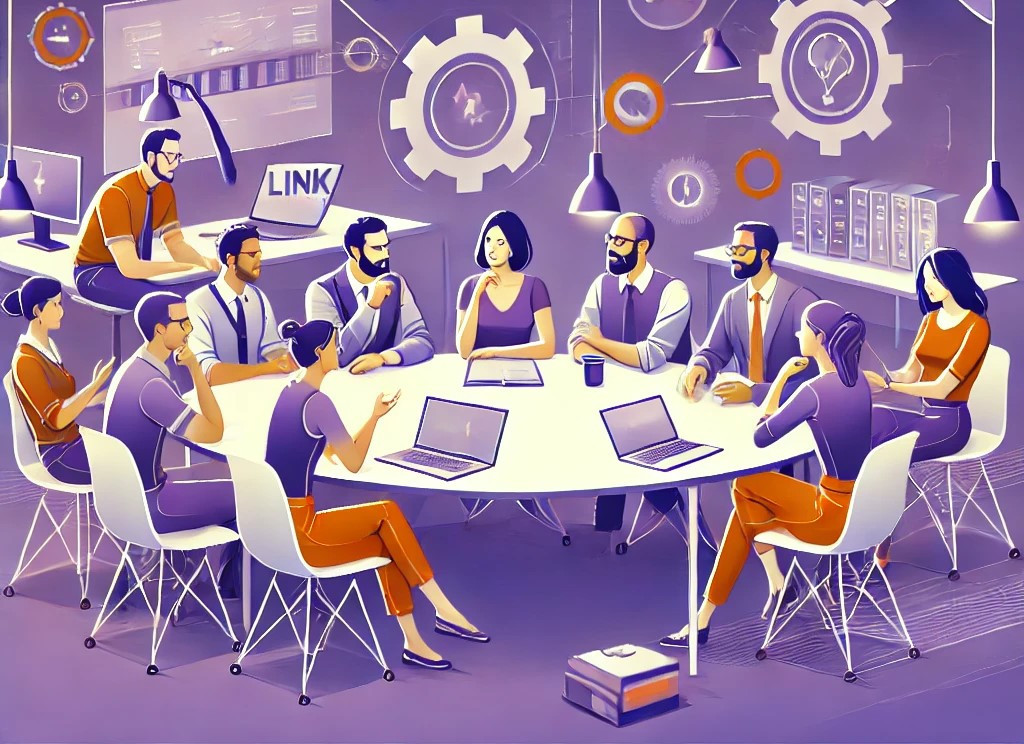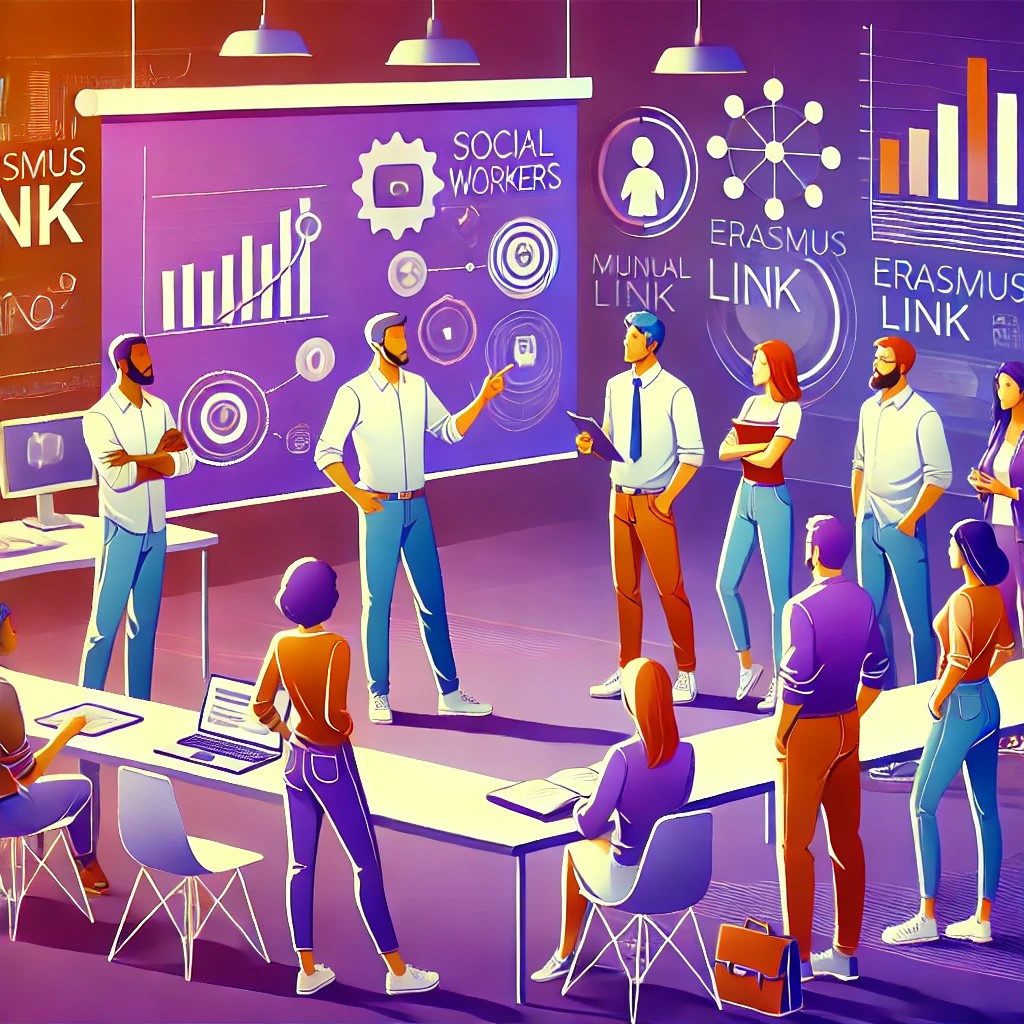Pictures are made with DALL-E, Open AI
Lessons learned

Lessons for establishing and managing the LAB
If we want to co-create, we need to open the space for new, different, unexpected perspectives
Through the development process of Slovenian LAB, where the initial concept guiding our actions is co-creation, we have tested our own limits of openness to new, different, unexpected views and ideas by collaborating with all participants. We know and understand the concept of co-creation, we have experience of working with people according to this concept, we agree that it is the concept we want to work according to. And yet, in a concrete situation, when we think about new activities or ways to achieve a desired outcome, how can we step back from our ideas that are so great, that seem so meaningful and so necessary?
Co-creation brings this challenge into the work process. But if we really manage to open a space where all voices can be heard and considered, then we can create the ideas and the steps to realise them. This does not mean that we have to give up our own views - we just have to allow others to contribute theirs. Co-creation means that together we create a new puzzle - one that contains all the pieces and is richer than the picture we imagined, even with the best intentions, as a good outcome.
From extrinsic to intrinsic motivation of LAB members
An important question that helped us to understand the development process of our LAB and contributed to a qualitative shift in the participation of LAB members was the question we asked ourselves after a few months of operation, namely the question of the motivation to be involved in the LAB. What motivates us to develop the LAB? Is our motivation (that of each individual member) external (e.g. expectations from superiors, invitation from the Faculty of Social Work, etc.) or internal (e.g. the desire to contribute to the development of innovation, the desire to grow professionally, etc.)? Most members reported a gradual shift from extrinsic to intrinsic motivation. When this shift occurred, it was easier to plan and carry out activities in the LAB, and there was a greater sense of cohesion among members, a sense of belonging to the LAB - in the sense that the LAB is shared, is "ours".
We have been reflecting on how this shift has happened, how we can contribute to the development of intrinsic motivation of LAB members. Here are some of the key lessons for us:
- planning meaningful and manageable activities for all LAB members (as opposed to insisting on activities that may be great ideas, but only for part of the team),
- -patiently invite co-creation (at least at the beginning of the LAB, it is necessary to patiently, slowly and repeatedly invite all LAB members into a joint process, exploring the possible contribution of everyone rather than starting from one's own ideas and pace of action),
- questioning what is needed to make LAB meaningful for each member (taking time to reflect when planning and implementing activities - where am I in the process, what do I feel comfortable with, what do I need to be able to participate, etc.),
- flexibility of action (as opposed to rigidly defined steps),
- a stronger sense of belonging to the LAB (as opposed to, for example, researchers delegating ideas to be implemented by practitioners and families).
The importance of an "outside" view when LAB members are already deeply involved in the process of action
During the LAB process, we had the opportunity to reflect on our work with a group of professors and students from five European countries, which proved to be a very welcome "outside" perspective for the team members, as someone who was "out of the picture" could offer a different perspective on the whole picture.
We presented our work to the guests and invited them to reflect on four topics relevant to us at the time (what the LAB brings new and ideas for a shorter name for the LAB, best practises in user participation, ideas for further activities, what we could do differently in the LAB), which were reflected on in a World Café principle. The team members were impressed by the freshness of the ideas for our future work.
Changing expectations through a secure relationship experience
Social workers and their interlocutors enter the process of support and assistance with certain expectations that need to be explored in the working relationship, as they guide the collaboration process and influence the relationship between the participants (Vidonja and Kustec, 2016; Trotter, 2023).
Aware of the importance and influence of expectations, the researchers from the Faculty of Social Work entered into a cooperation with the practitioners from SWC Spodnje Podravje when setting up the LAB. The aim of the first meeting was therefore to get to know each other and set initial expectations. However, it quickly became apparent that the LAB practitioners had difficulties articulating their expectations at the beginning of the cooperation, as they did not know us or the objectives of the LAB and were also afraid that their participation in the LAB would represent an additional workload for them.
How to open a space for exploring expectations when participants do not (yet) seem to have expectations or when expectations are very different?
It was very important that the researchers did not define the collaboration too quickly with their expectations of the LAB's work, but rather opened a space for everyone to have their say (through various activities such as the Consensus building activity, ensuring that everyone had the opportunity to voice their opinion when a question was raised, etc.). This experience of being heard, being open to new ideas and opinions, and feeling that the practitioners were our equal interlocutors in the work process helped to create a safe and confidential space. This experience helped the practitioners to articulate what they wanted to build on in the LAB, which served as a guideline for further joint collaboration. It was necessary to open up the space to talk about expectations and possible ways to fulfil them, as these changed or were redefined during the collaboration process.
Lessons about education
How do you get what you need in education?
In the educational process - whether formally to achieve a certain level of education or informally in the context of various seminars and workshops in which we acquire additional competences in the course of lifelong learning - we as participants in education are usually involved in such a way that we choose between the topics already offered and the planned methods of education. As a rule, the creators of the educational content themselves assume which competences would be necessary for the potential participants to be able to perform their work well or better. How can I do this as a planner of educational content if I do not know exactly which competences the potential participants in the education already have and which ones they lack? Do I make assumptions? If I do, I may over- or underestimate the competences of the potential participants.
In the framework of LAB in Slovenia, we wanted to develop educational content that would primarily strengthen the competences of professionals in the social work centre, because one of our main goals was to strengthen competences for working with families facing multiple challenges and for teamwork (within social work centre and transdisciplinary). In line with our idea of the importance of co-creation at different levels, we took a different approach to preparing the educational content than usual.
Education as gradual process
Since we did not have an exact answer to the question of what additional competences professionals needed and at the same time wanted to avoid the mistake of overestimating or underestimating competences, we held a workshop with professionals to co-create educational content and identify competence gaps.
The type of competences we wanted to build was not pre-determined by the researchers/lecturers, but we agreed on some common activities using the World Café method. The professionals were asked which competences support them in their daily practise, where they lack additional competences and which ones they need to acquire in order to be able to respond more competently to the needs of users and in cooperation with other professionals/institutions.
As it is a gradual process, they decided that the main topic should be – how to improve the social work with families and the competences to support the work with other professionals.
We started with workshops on applying the concept of co-creation with a particular focus on dealing with uncertainty. The education was aimed to acquire the following competences:
- establish and maintain a working relationship of co-creation,
- use the language of social work to co-create with families,
- to withstand the uncertainty of co-creation,
- creating an eco-map of resources with the families
Front-line staff from the social work centre have also set up an intervision group with primary school counsellors and employees in the Mental health center, and we will address their possible lack of competences in a transdisciplinary context. Nevertheless, they report that collaboration based on concept of co-creation also seems to achieve good results among professionals.

Pictures are made with DALL-E, Open AI
Discussion (0) Sign in to comment
No comments was found!